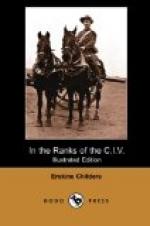August 26.—Breakfast at seven. Told we were going to shift. Packed up and shifted camp about a mile to some trees; the other site was horribly smelly. Installed again in a tent. I have a hardened old shell-back of a Tommy (Yorkshire Light Infantry) on my right, and a very nice sergeant of the Wilts Regiment on my left. Some of the former’s yarns are very entertaining, but too richly encrusted with words not in the dictionary to reproduce. How Kipling does it I can’t think. The sergeant is a fine type of the best sort of reservist. He astonished me by telling me he had been a deserter, long ago, when a lad, after two years in the Rifle Brigade, where he was sickened by tyranny of some sort. He confessed, after re-enlistment, and was pardoned. He had been fourteen years in his present corps, and had got on well. Opposite is a young scamp of Roberts’s Horse. Looks eighteen, but calls it twenty-two: his career being that he was put in the Navy, ran away, was apprenticed to the merchant service, ran away (so forfeiting the premium his parents had paid), shipped to the Cape, and joined Roberts’s Horse. I asked him what he would do next. “Go home,” he said, “and do nothing.” If I were his father I’d kick him out. He’s a nice boy, though. There are several Munsters, jolly chaps, and a Tasmanian of the Bush contingent, tall, hollow-eyed, sallow-faced fellow, with dysentery—a gentleman, and an interesting one. Williams has been here a good deal. He made some tea for the two of us in the evening, and we talked till late. I am on ordinary “camp diet,” which means tea, biscuit, and bully-beef or stew. They give us tea at four, and nothing after, so one gets pretty hungry. Some men are on milk diet.
August 27.—Monday.—My foot gets on very slowly. Veldt-sores, as they are called, are very common out here, as though you may be perfectly well, as I am, the absence of fresh food makes any scratch fester. Most entertaining talks with the other chaps in the tent. The Captain has been several times, and brought papers.
August 28.—This is a very free-and-easy field hospital; no irksome regulations, and restrictions, and inspections. A doctor comes round in the morning and looks at each of us. The dressings are done once in twenty-four hours by an orderly. He is a very good chap, but you have to keep a watchful eye on him, and see that he doesn’t put the same piece of lint on twice; yet you must be very tactful in suggestions, for an orderly is independent, and has the whip-hand. An officer walks round again in the evening, pretty late, and says he supposes each of us feels better. This very much amused me at first, but, after all, it roughly hit off the truth. We are nearly all slight cases. Meals come three times a day, and otherwise we are left to ourselves. The food might, I think, be better and more plentiful. I have had the privilege of hearing Tommy’s opinions on R.A.M.C. orderlies, and also those of




